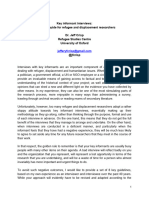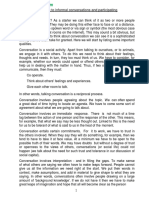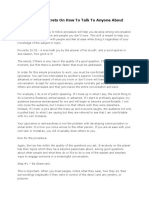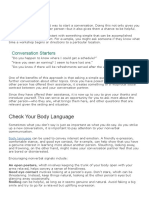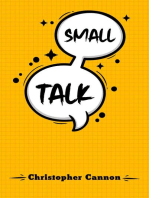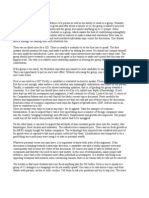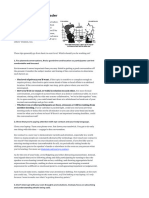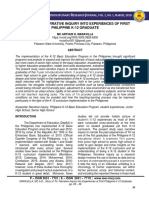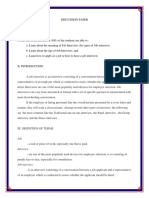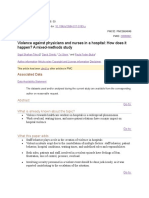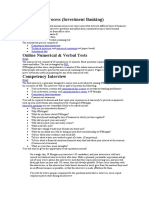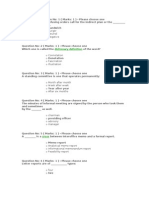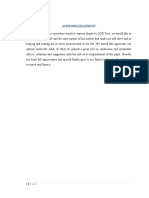Professional Documents
Culture Documents
Design Thinking Week
Design Thinking Week
Uploaded by
Ángela Rojas0 ratings0% found this document useful (0 votes)
25 views5 pagesThis document provides guidance on conducting ethnographic interviews for design thinking projects. It discusses framing the interview to make informants comfortable, conducting the interview through non-directive questioning to avoid leading informants, and organizing interview notes so the researcher can effectively analyze the data. The goal is to elicit meaningful perspectives from informants and treat them and their contributions with respect.
Original Description:
Copyright
© © All Rights Reserved
Available Formats
PDF, TXT or read online from Scribd
Share this document
Did you find this document useful?
Is this content inappropriate?
Report this DocumentThis document provides guidance on conducting ethnographic interviews for design thinking projects. It discusses framing the interview to make informants comfortable, conducting the interview through non-directive questioning to avoid leading informants, and organizing interview notes so the researcher can effectively analyze the data. The goal is to elicit meaningful perspectives from informants and treat them and their contributions with respect.
Copyright:
© All Rights Reserved
Available Formats
Download as PDF, TXT or read online from Scribd
Download as pdf or txt
0 ratings0% found this document useful (0 votes)
25 views5 pagesDesign Thinking Week
Design Thinking Week
Uploaded by
Ángela RojasThis document provides guidance on conducting ethnographic interviews for design thinking projects. It discusses framing the interview to make informants comfortable, conducting the interview through non-directive questioning to avoid leading informants, and organizing interview notes so the researcher can effectively analyze the data. The goal is to elicit meaningful perspectives from informants and treat them and their contributions with respect.
Copyright:
© All Rights Reserved
Available Formats
Download as PDF, TXT or read online from Scribd
Download as pdf or txt
You are on page 1of 5
Design Thinking Week
Design thinking refers to creative strategies designers use during the process of
designing.It has also been developed as an approach to resolve issues outside of
professional design practice, such as in business and social contexts.
Empathy
https://www.youtube.com/watch?v=BG46IwVfSu8
https://www.youtube.com/watch?v=z_-rNd7h6z8
Ethnographic Interviews - Framing
The Ethnographic Interview - Framing
source: University of California San Diego http://ucsd.edu/
The Big Picture
For generations, "participant observation" has been the prime source of data for
cultural anthropologists. This normally involves residence among one's informants
for a long time, typically a year or two, sometimes ten or more. For class purposes,
this is not feasible, and data collection is more dependent upon formal interviews.
Informants are usually delighted to talk to you, especially to tell you about things
that they are expert about and interested in, such as themselves. However never
forget that they are you doing you a favor, however much they may enjoy it. Be
courteous, obliging, and interested. Bringing them cookies is absolutely in order.
So is thanking them profusely.
Framing The Interview
Informants' Comfort. Formal interviews require the full knowledge and
cooperation of the informant. To conform to modern "human subjects research"
standards, informants should always be told that there is no obligation to answer
any particular question, and that the interview can be stopped at any time. (This is
different from journalism or police interrogation. Journalists and police
interrogators have standards too, but they are not considered to be dealing with
"human subjects" and therefore have less obligation to make informants feel
comfortable.)
Informants' Privacy. The informant should be told what level of confidentiality to
expect. For example, "I don't plan to discuss what you have told me in a way that
can be traced to you. Or, "Barring the unforeseen, only my professor and I will be
able to link your name to the material you provide to me." Or, "I expect to discuss
specific cases only with pseudonyms."
Time Commitment. You should tell your informant in advance roughly how much
time you think an interview will require, so the informant knows how to plan and
how extensively to answer your questions. (In contrast, be sure that you yourself
have enough time for it to go much longer if the informant turns out to be
providing good information and enjoying doing so. Some informants love talking
and can be longwinded.)
It is possible to conduct an interview over Skype or on the telephone. It is not as
fecund as a face-to-face interview, but it can still be useful. Interaction through a
keyboard, however, should not be considered an interview. It is simply not realistic
to imagine that your informant will type more than s/he will talk, and pretending
that an Email exchange is all your informant understands about something is unfair
both to your informant and to your reader. Conquer your inner wimp and face the
world of living humans.
Preview of the Topic. Tell the informant ahead of time what the broad topic is that
you are interested in. That way you will probably avoid being turned down after
you start if the discussion goes in directions your informant didn't anticipate.
Sometimes you are interviewing an acknowledged expert about something (a
famed potter, for example), and most of the interview will probably focus on that
person's expertise. Sometimes an expert is in the position of speaking for an
institution (a person such as the founder of a company or the head of an office).
That is more difficult, since such a person may try to make the institution look
good, or anyway, not to reveal anything that might make it look bad. In these
examples, the potter may be happy to tell you how many pots break during firing.
The head of an office will probably not tell you how many people get fired for
various reasons. (That is one of the reasons why journalists often like to talk
to former politicians and military officers rather than the ones still in office.)
Whether this complicates your project depends, obviously, on the goals of your
interviewing.
At other times you may interview a person who does not consider himself to have
any special knowledge of what you say you want to know about, and who tells you
to go find an expert. ("I don't know much about history. Go look it up in the
library.") To avoid that reaction, keep the topic broad, but also stress that you are
interested in the informant's particular perspective or in what the informant may
have heard or learned from others. (For example: "We have been studying about
the goddess Mazu, and I am really interested in what individual Taiwanese people
know about her or think about her and how they learned about her.")
Conducting The Interview Tips
Non-Directive Interviewing. In general, you hope to learn from informants
something you don't already know. This means it is important to ask questions in
such a way that you don't accidentally "lead" informants into saying what you
already think rather than what they mean. In other words, you need to conduct
"non-directive" interviewing.
A non-directive approach would perhaps ask, "Tell me a little bit about relations
between Chinese and Japanese at that time." This doesn't presume that relations
were good or bad, or even that good-bad is the relevant axis on which to describe
them. (You may have surprises. For example: "I thought the Japanese soldiers
were incredibly cool, and I felt really inadequate not being able to speak
Japanese.) Once the informant starts on a discussion, you can then ask for
examples or clarifications that gradually elicit what it is that you are trying to learn.
Directive Interviewing. Despite its advantages, non-directive interviewing is not
usually very efficient at getting around to what you most want to know. You nearly
always need some specific questions to set the topic or to follow up or clarify. For
example imagine that you are eliciting a life history and have reached the school
years. You might say, "I'd like to start by learning a little about what your school
was like when you lived there."
Sustaining Flow
Most informants prove pretty talkative if they are on a topic they both know and
care about. HOWEVER:
Normal people don't like talking to the wall. You need to show continuing interest
with nods and grunts and little conversational tags like, "I see" and
"Really?" ("Hallelujah!" is a bit over the top, but you get the idea.)
Sometimes repeating a striking word that the informant has used will result in an
elaboration. For example:
"She gave Jeff some money."
"Money?"
"Yeah, about $20, I think; that's all she had."
Such elaborations by informants can often lead to surprisingly useful discussions.
Some other useful ways to keep people talking if they seem to run dry are
questions like the following:
Why did that happen?
Tell me a little more about that.
What happened next?
How did that make you feel?
How did he explain that to his brothers?
A yes-no question is rarely useful except for lawyers and congressmen trying to
bully witnesses. That is not your goal. One problem is that you are formulating the
answer when you create the yes-no question, which means it did not originate with
the informant. For another, a simple yes or no does not tell you how the informant
actually understood the question, if at all. (Especially if there is a language barrier,
saying "yes" is often a polite way of indicating that one did not understand the
question.)
A good rule of thumb is that if an informant answers "yes," it doesn't count as
information. If an answer is "no" you need to ask for a clarification of how you got
it wrong. A better rule of thumb is to avoid such questions.
Pauses.
Some people have higher tolerance for pauses in a conversation than other people
do. The fact that your informant stops talking for a time doesn't necessarily mean
you should move on right away. It may be no more than a normal pause to organize
what to say next.
Actual lags in the conversation are opportunities. Sometimes an informant has said
something provocative but somewhat beside the point at the time. If so, you may
want to shift to that topic when the conversation seems to run down later. As an
attentive interviewer you may wish to return when opportunity presents itself.
("We never really got back to the issue of your violin lessons." "I don't think I really
understand why you didn't think he should know about it.")
Biased Questions.
We all know that how a question is worded can affect the answer. That is why the
opposite of "right to life" is "right to choose" when both phrases refer to the
legalization of abortion, or why "freedom of religion" is sometimes a code word for
opposition to "gay rights." However even very minor shadings of difference can
affect the outcome of a question.
Organizing Your Notes and Being an Expert
Once you have interviews from more than one informant, your interviews are
your claim to fame because they are a data source available to nobody else.
They are subject matter about which you are the unique world authority.
Whatever their limitations, they are what justify your claim to the attention of
your readers or listeners. They are critical supports for your best analyses
and they are the first-order disconfirmations of your wrong hunches. They
should be as organized and helpful to you as you can make them. You don't
have to put them on an altar and sacrifice chocolate-chip cookies to them,
but treat them with the respect they deserve.
1. The first step in that is making sure they are well organized and adequately
indexed so that you can find information when you look for it. Beyond simply
backing stuff up, three "best practices" should be observed almost fanatically:
2. Assume that your information retrieval system may some day have to
accommodate thousands of pages/bytes. Paper pages need to be uniquely
numbered. Computer files need to be well organized. Do it immediately! For
paper notes, create an index and update it whenever stuff is added. For
computer files, identify keywords and put them all in caps. List them
somewhere. If you collect pictures, pamphlets, or other materials, have a
system to link them to your notes. It should be infinitely expandable.)
(Suggestion: I have found it useful to tag everything possible with a six-digit
date: YYMMDD. These can be sorted in order by even a very stupid computer,
are unambiguous for a century, and can easily link things like pictures, diary
entries, pamphlets, regular fieldnotes, or even financial records.)
3. The key to all this is to assume that you will look back at your notes fifty
years from now and will have forgotten entirely whatever was not written
down, including any abbreviations or arbitrary conventions that you adopt.
(Don't assume you will remember anything at all. If you plan on being dim or
dead by the time the notes are next used, you will make the written lists and
explanations that can avoid the embarrassment of forgetting what conventions
you adopted)
4.Assume that all computer operating systems and data standards will have
changed before you are through with the notes, and that you will need to be
able to convert them from one system to another against the resistance of the
computer industry. (Don't use fly-by-night software. Don't depend on
metadata, "tags," or "smart quotes" for anything that matters. Stick with
mainstream file formats.)
If you make those three assumptions, you will soon find yourself
organizing things adequately. Well, actually, you should probably also
assume that if you procrastinate in organizing and indexing, you will be
eaten by a big, bad wolf.
Nethunting - Ethnography Online
Nethunting is the art of finding relevant information online. It uses ethnography
principles applied to to online environments.
Part of your team will go out and conduct real time interviews while two or three of
you will stay in the room connect to the main social networks and reserach on
relevant opinions related to your DTW18 challenge
You might also like
- Key Informant Interviews: A Practical Guide For Refugee and Displacement ResearchersDocument6 pagesKey Informant Interviews: A Practical Guide For Refugee and Displacement ResearchersJeff CrispNoch keine Bewertungen
- How to Use Mental Pickpocketing to Get to the Truth Without Seeming to Ask Questions: Career Savvy People Skills, #2From EverandHow to Use Mental Pickpocketing to Get to the Truth Without Seeming to Ask Questions: Career Savvy People Skills, #2Rating: 5 out of 5 stars5/5 (1)
- What To Say NextDocument12 pagesWhat To Say NextAna Maria100% (1)
- Module 1 Community DevelopmentDocument11 pagesModule 1 Community DevelopmentAlthea Valenzuela100% (3)
- How To Think For Yourself - Paul GrahamDocument9 pagesHow To Think For Yourself - Paul GrahamJacob BanfieldNoch keine Bewertungen
- Food and Beverage FB Manager Interview Questions PDFDocument2 pagesFood and Beverage FB Manager Interview Questions PDFPravesh Sharma100% (1)
- WWW Faceprep in Reliance Reliance Industries Interview QuestionsDocument7 pagesWWW Faceprep in Reliance Reliance Industries Interview Questionshardik nasitNoch keine Bewertungen
- Oralcom Quarter2 Module 7Document47 pagesOralcom Quarter2 Module 7ՙՙՙՙՙ ՙՙՙՙՙ ՙՙՙՙՙ88% (8)
- Conversation Skills: Book Two in the Life Mastery CourseFrom EverandConversation Skills: Book Two in the Life Mastery CourseNoch keine Bewertungen
- SodapdfDocument4 pagesSodapdfSaru TVNoch keine Bewertungen
- Overview of The Interview Essay ProcessDocument19 pagesOverview of The Interview Essay ProcessAlinutza BzzaNoch keine Bewertungen
- Technical English - NotesDocument82 pagesTechnical English - NotesSyed Safeequr Rahman100% (1)
- Holding Your Own ConversationDocument3 pagesHolding Your Own ConversationErma YuniatyNoch keine Bewertungen
- Asking Questions: Techniques For Semistructured Interviews: by Rutgers UniversityDocument4 pagesAsking Questions: Techniques For Semistructured Interviews: by Rutgers UniversitysarjNoch keine Bewertungen
- Conversation Secrets On How To Talk To Anyone About AnythingDocument4 pagesConversation Secrets On How To Talk To Anyone About AnythingKpNoch keine Bewertungen
- Prewriting: With The Wind. Leigh Ended The Interview Before It Started. Contrast That With TheDocument4 pagesPrewriting: With The Wind. Leigh Ended The Interview Before It Started. Contrast That With TheaparajitaduttaNoch keine Bewertungen
- Ask For HelpDocument3 pagesAsk For Helpit estNoch keine Bewertungen
- Unit II Professional SkillsDocument12 pagesUnit II Professional SkillsVarun GoheNoch keine Bewertungen
- Coversational EttiquteDocument45 pagesCoversational Ettiquterichard kayNoch keine Bewertungen
- 1599738588unit 1 Speaking CharacteristicsDocument15 pages1599738588unit 1 Speaking CharacteristicsFadhil AhcyariNoch keine Bewertungen
- A1638100148 - 23912 - 23 - 2019 - Group BrainstormingDocument6 pagesA1638100148 - 23912 - 23 - 2019 - Group BrainstormingHarshaNoch keine Bewertungen
- The Expert Approach: Developed by Shoney FloresDocument2 pagesThe Expert Approach: Developed by Shoney FloresShoney FloresNoch keine Bewertungen
- Group DiscussionDocument17 pagesGroup DiscussionJaideep YadavNoch keine Bewertungen
- Victoria Healey-Etten and Shane Sharp - 12 Handy In-Depth Interviewing TipsDocument2 pagesVictoria Healey-Etten and Shane Sharp - 12 Handy In-Depth Interviewing TipsCarla MatiasNoch keine Bewertungen
- SMALL TALK: Relationship building and the art of persuasion. How to Confide in People, Calm Your Nerves, and Boost Your Charm (2022 Guide for Beginners)From EverandSMALL TALK: Relationship building and the art of persuasion. How to Confide in People, Calm Your Nerves, and Boost Your Charm (2022 Guide for Beginners)Noch keine Bewertungen
- Conversation As Communication: Ambiguity AvoidanceDocument10 pagesConversation As Communication: Ambiguity AvoidanceAnshul GoyalNoch keine Bewertungen
- Small Talk - EngwkDocument4 pagesSmall Talk - Engwkengielyn taduranNoch keine Bewertungen
- The Guide To Support Positive Communication: Casey M SmithDocument23 pagesThe Guide To Support Positive Communication: Casey M Smithapi-256430184Noch keine Bewertungen
- How To Do ResearchDocument7 pagesHow To Do ResearchLeeWeiNoch keine Bewertungen
- HS6251 Technical English II Lecture Notes Regulation 2013 PDFDocument82 pagesHS6251 Technical English II Lecture Notes Regulation 2013 PDFHariNoch keine Bewertungen
- QweDocument11 pagesQweshaheerdurraniNoch keine Bewertungen
- Tips On How To Open A ConversationDocument17 pagesTips On How To Open A ConversationSonny ObienaNoch keine Bewertungen
- How To Write A SpeechDocument20 pagesHow To Write A SpeechMonique Oates50% (2)
- How To Get To Know Someone 53 Great Questions To AskDocument6 pagesHow To Get To Know Someone 53 Great Questions To Askgougougr8499Noch keine Bewertungen
- ted-better conversation -영문Document3 pagested-better conversation -영문윤소원Noch keine Bewertungen
- Group DiscussionDocument61 pagesGroup DiscussionAkshay ManakapureNoch keine Bewertungen
- 50 Interesting Conversation TopicsDocument14 pages50 Interesting Conversation TopicsAndrew Jude St-Fleur100% (1)
- What To Say NextDocument18 pagesWhat To Say NextMarkWoodxxx100% (6)
- 13 Ways To Start A ConversationDocument11 pages13 Ways To Start A ConversationImagin AridaNoch keine Bewertungen
- Handout What Is Multimedia JournalismDocument10 pagesHandout What Is Multimedia JournalismANTONETTE P. CASTILLONoch keine Bewertungen
- What Do A Lot of People Fear Most? NOW: Public Speaking of Course!Document16 pagesWhat Do A Lot of People Fear Most? NOW: Public Speaking of Course!sanela_tunovicNoch keine Bewertungen
- Art of Small TalkDocument2 pagesArt of Small TalkLadylein RedadoNoch keine Bewertungen
- How To Do Small TalkDocument22 pagesHow To Do Small TalkYlan TulumeNoch keine Bewertungen
- Writing Culture Studies Papers: The Object, Question, Lens and Method ApproachDocument20 pagesWriting Culture Studies Papers: The Object, Question, Lens and Method ApproachTheresa SenftNoch keine Bewertungen
- 7 Deadly SinsDocument23 pages7 Deadly Sinsagus.bismawan1981Noch keine Bewertungen
- Small Talk2Document12 pagesSmall Talk2api-37596970% (1)
- Architectural JournalismDocument14 pagesArchitectural Journalismkishore dhoniNoch keine Bewertungen
- Lecture 01 Hinerman SpeechesDocument9 pagesLecture 01 Hinerman Speecheslingu easyNoch keine Bewertungen
- 1B Handbook For Public SpeakingDocument9 pages1B Handbook For Public SpeakingAnonymous kdFY3aNoch keine Bewertungen
- One Source For Pretty Reliable Advice Is What Has Been RepeatedDocument5 pagesOne Source For Pretty Reliable Advice Is What Has Been RepeatedChifuyuNoch keine Bewertungen
- I. What Is A Successful Conversation Which Factors Make A Successful ConversationDocument5 pagesI. What Is A Successful Conversation Which Factors Make A Successful ConversationDũng ĐỗNoch keine Bewertungen
- 1 Love & Relationships - 5 Deep Questions To Ask A Guy To Find Out Who He Really IsDocument4 pages1 Love & Relationships - 5 Deep Questions To Ask A Guy To Find Out Who He Really IsJoddyNoch keine Bewertungen
- QuestioningDocument51 pagesQuestioningJosé Miguel Najul100% (1)
- Micron Talking TipsDocument4 pagesMicron Talking TipsFally IPUPANoch keine Bewertungen
- How To Listen Like A LeaderDocument4 pagesHow To Listen Like A LeaderNyoNoch keine Bewertungen
- Learning To Say NoDocument2 pagesLearning To Say NoAllen FaderogaoNoch keine Bewertungen
- Conversation As Communication: by Gerard M BlairDocument10 pagesConversation As Communication: by Gerard M Blairanon-170664Noch keine Bewertungen
- The Fine Art of Small TalkHow To Start A Conversation Build Networking Skills by Debra FineDocument8 pagesThe Fine Art of Small TalkHow To Start A Conversation Build Networking Skills by Debra FinesimasNoch keine Bewertungen
- FileDocument6 pagesFilerockNoch keine Bewertungen
- TED: Celest Headlee: 10 Ways To Have A Better ConversationDocument4 pagesTED: Celest Headlee: 10 Ways To Have A Better ConversationHerlem CamposNoch keine Bewertungen
- 7 Tips To Deliver A Captivating Impromptu SpeechDocument6 pages7 Tips To Deliver A Captivating Impromptu SpeechJeanelle Anne BarañaNoch keine Bewertungen
- Story of Tin: Narrative Inquiry Into Experiences of First Philippine K-12 GraduateDocument9 pagesStory of Tin: Narrative Inquiry Into Experiences of First Philippine K-12 GraduateIOER International Multidisciplinary Research Journal ( IIMRJ)Noch keine Bewertungen
- Job InterviewDocument4 pagesJob InterviewVerzosa MariaNieva100% (1)
- Violence Against NursesDocument22 pagesViolence Against NursesQuality Assurance Officer Total Quality ManagementNoch keine Bewertungen
- Data Collection Methods and Procedure Definition of DataDocument13 pagesData Collection Methods and Procedure Definition of Dataactionae mr fixitNoch keine Bewertungen
- FS 5 Episode 3Document6 pagesFS 5 Episode 3szarielle yumiko100% (3)
- Issues Relating To Factual Programming For TelevisionDocument16 pagesIssues Relating To Factual Programming For TelevisionpharezeNoch keine Bewertungen
- Application ProcessDocument2 pagesApplication ProcessMaheeshNoch keine Bewertungen
- Eng 301Document2 pagesEng 301Assad ButtNoch keine Bewertungen
- Kvale Doing Interviews Ch.1 Introduction To Interview ResearchDocument11 pagesKvale Doing Interviews Ch.1 Introduction To Interview ResearchAle NeagNoch keine Bewertungen
- AcknowledgementDocument47 pagesAcknowledgementadisu desalegnNoch keine Bewertungen
- Migrant Construction Workers Health Safety Communication - tcm17 25018Document33 pagesMigrant Construction Workers Health Safety Communication - tcm17 25018Vikki KalilNoch keine Bewertungen
- Understanding The Purpose of A Job InterviewDocument4 pagesUnderstanding The Purpose of A Job Interviewuphie zakiNoch keine Bewertungen
- Scarborough Finch Ave YMCA Centre CalendarDocument2 pagesScarborough Finch Ave YMCA Centre CalendarSami Shahid Al IslamNoch keine Bewertungen
- Sight Translation Hoang Thanh An - QHF1.2007Document77 pagesSight Translation Hoang Thanh An - QHF1.2007Nương ĐoànNoch keine Bewertungen
- Qualitative Research Methods Why When and How To - 2016 - Currents in PharmacDocument8 pagesQualitative Research Methods Why When and How To - 2016 - Currents in PharmacJeff KandellaNoch keine Bewertungen
- RM Module-3Document82 pagesRM Module-3mahanth gowdaNoch keine Bewertungen
- Espoir Smart Interview SimulatorDocument2 pagesEspoir Smart Interview Simulatorsurnam63Noch keine Bewertungen
- Case Study Analysis of Six Sigma Implementation in Service OrganisationsDocument28 pagesCase Study Analysis of Six Sigma Implementation in Service OrganisationsRofifah MiftahurrahmiNoch keine Bewertungen
- Test 20 TapescriptDocument8 pagesTest 20 TapescriptKhoa LêNoch keine Bewertungen
- 411 Research Methods AnalysisDocument10 pages411 Research Methods AnalysisReina Krizel AdrianoNoch keine Bewertungen
- Raji 2018Document25 pagesRaji 2018Anirudh Naik 1820657Noch keine Bewertungen
- IDENTIFYING A RESEARCH PROBLEM Summary'Document14 pagesIDENTIFYING A RESEARCH PROBLEM Summary'NammaNoch keine Bewertungen
- Data Collection InstrumentsDocument18 pagesData Collection Instruments-100% (1)
- 'Rural Marketing ResearchDocument19 pages'Rural Marketing ResearchASK ME ANYTHING SMARTPHONENoch keine Bewertungen
- Doeacc Payroll Report O LevelDocument153 pagesDoeacc Payroll Report O Levelkaushal2442Noch keine Bewertungen
- Interviewing CandidatesDocument18 pagesInterviewing CandidatesZumrat Hossain Sajan100% (1)
